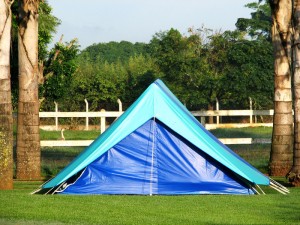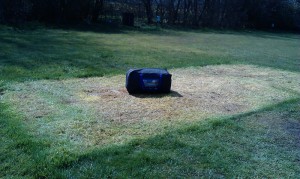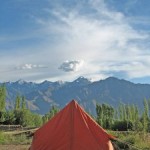How to Take Care of Your Tent
Take care of your tent and your tent will take care of you! Your tent is the most important part of your camping kit. It is where you will sleep, socialise, eat, and enjoy that late night tipple inside or outside watching the sunset!
 Looking After Your Tent:
Looking After Your Tent:
Properly looked after, your tent will last season after season and make your camping trips much more comfortable. You will see, over the years new tent improvements with the newest models, but an older tent is like a fine wine… it improves with age, with all the hiking and camping stories that go along with the tent. The following are some helpful hints and maintenance tips on how to take care of your tent.
Before Using Your Tent:
Get to know your tent! When I first discovered camping, as a single parent, I found myself developing a relationship with my tent! It took lots of time, care, appreciation and commitment to get to know it. Now, years down the line, I can say I have fallen ‘pole, peg and zipper’ and I am deeply in love!
Practice makes perfect and before the initial camping trip it is easier to practice in your home, or in the garden when the weather is dry and calm. You don’t need a windy day to make the job of setting up the tent any harder than is necessary. This is a tried and tested method of mine and believe me, its worth it, as pitching a tent for the first time alone in the middle of a campsite, with onlookers, can be very stressful and a little embarrassing. Believe me – I know!
“I have fallen ‘pole, peg and zipper’ and I am deeply in love!”
It will also ensure you can check all the parts are present and undamaged. By practicing beforehand, you will have an idea of what to do when you arrive on the site and have less chance of ripping, bending or breaking any part of the tent.
Pitching Your Tent:
- Ideal Location: Select an area which is as flat as possible. Avoid low lying or marshy ground which could flood in heavy rain. It is better not to pitch under trees as a tree will drip long after the rain has stopped, some trees drop sticky sap and birds don’t care where they drop!
- Element Protection: Make use of any natural windbreaks, such as hedges and try to face the tent door away from prevailing wind if possible.
- Ground Cover: A tent footprint, tarpaulin, or inexpensive builder’s plastic sheeting used as ground cover will protect your tent from objects ripping through the bottom of the floor of the tent as well as protect the tent from dirt, I have found that old shower curtains also work well.
- All Clear: Always try to clear the pitch of anything which could damage the groundsheet, stones, sticks or other sharp objects. (This is a great job for little helpers, as kids are always eager to help ‘put the tent up’!) The added layer will add some extra warmth and comfort to the floor inside. It also helps keep water out of the tent and damp rising up from the cold ground.
 Using Your Tent:
Using Your Tent:
- Neat and Tidy: Keep tent exits clear and free from obstructions. From my experience the girls only have to leave one shoe in the doorway and I do a very unladylike dance trying hard not to grab the tent to steady myself! Anyone will grab the nearest thing in desperation to stop them falling and in my experience, this is often the tent wall or hanging toggles, which can damage zips or rip the tent seams!
- Ventilation is Key: Keep ventilation going through the tent. Condensation can occur in nylon/polyester tents and even cotton and should not be confused with leakage. To reduce condensation ensure that the tent is well ventilated at all times. When you sleep and stay in a tent, moisture might accumulate inside. If a window or flap remains open a little bit, it will keep condensation away from the inside of the tent.
- Safety First: DO NOT place cooking, heating or lighting appliances near sides of tent or fabric and always enjoy bbq‘s at a safe distance outside and AWAY from the tent. NEVER allow children to play near or with lighted or heated appliances.
- Keep the Area Clean: Remove dirt and stains along with bird droppings or tree sap when you spot them by either brushing or gently sponge washing with water. Clean off any as soon as you see it. NEVER use detergents. To be on the safe side, always check your tent manufactures instructions to avoid unnecessary damage.
- Beware of the Pokies: Avoid leaving sharp objects lying around the tent, especially if you have a sewn in groundsheet. Loose tent pegs, cooking utensils and even those very handy wooden skewers we use for our toasted marshmallows can cause damage such as rips or tears.
- Zipper Care: Zips should be treated with respect. My daughter seems to love the sound of the bedroom zip going up and down at 6 in the morning, in tune with the birdsong outside the tent, but after explaining that zips are there to keep bugs and beasties out, and if the zips are damaged or come away at the seams, the bugs and beasties will get in .… she now hums a tune instead!
“Keep the bugs and beasties out”
If your zip starts sticking, try not to force it. There are special lubricants on the market to free it up or you could use beeswax, or from experience, which I’ve used in the past, hardened wax from an unlit candle.
After Using Your Tent:
- Wipe Down: When you pack away your tent it is important to ensure that it is clean. Ensure all food crumbs, stones and any other items are swept away and remove any pests, such as spiders, bugs and (your children), from the corners of the tent.
- Disinfect: I always spray the sewn in groundsheet floor and windows of my tent with antibacterial spray. This kills any germs left behind and creates an environment that is unfriendly for future bacteria.
- Air Out: It’s best to let the tent air before your departure from the campsite. Hopefully this should be done on a hot or warm day to get the quickest and best results, but if, like me, you camp in England a lot, this may have to be done at home!
- Store All Bits Away: Keep all spare pegs, guys and other small parts in a sealable bag and wipe them off before putting them away. Keep the bag somewhere dry and handy so you can pop any bits into it straight away while packing away.
 Storing Your Tent:
Storing Your Tent:
- Cleaned and Dry: Before storing the tent ensure that it is completely dry and that any mud has been removed. Tents are best stored opened out in a dry well aired place. If this is not possible, air tent on a dry day or indoors if necessary.
- Reproofing Your Tent: Mildew affects cloth when a tent is stored in damp or wet conditions. At first signs, dry out the tent completely. Brush carefully and re-proof which is a paint or spray that you coat your tent with to waterproof and protect the colour from UV rays. You do not usually need to reproof your tent unless it is quite a few years old. Newer nylon/polyester models on the market nowadays do not usually need reproofing which makes this part of camping a lot easier.
- Organized Storing: Always store pegs and poles separately, along with your mallet, so pitching equipment can be found easily on your next trip.
Obviously a tent can’t be totally cleaned while hiking, car camping, etc, but always make sure the tent is not packed away while it is still wet. Try to dry off the tent as much as possible and if the tent has to be packed away a little wet, unpack it as soon as possible to help dry it out again. Do not put your tent on a heat source such as a drier or on a radiator is it could melt or the fabric coatings may be damaged. Usually a washing line, or re-pitching in a cool place such as a garage or in the garden will allow your tent to dry sufficiently so it can be repacked into the bag.
An Emergency Repair Kit for Your Tent:
If you have room to pack it, here is a short list of useful items that will help if you have a problem with your tent or indeed other camping kit. Bring any extra tent parts that might help you if the tent needs some repair – a little preparation in advance will help out in the end.
• Spare pole section
• Self-adhesive tent patches
• Needle, thimble and strong thread
• Eyelet kit with punch and eyeleting tool
• Spare guy lines and fittings
• Tube of seam sealant
• Gaffer/Duct tape
Here are some Tent Repair Kits & other items that may help fix any issue you may run into.
Good luck, and Happy Camping!
Author: Rosie Austin
(The CampTrip Team)




This article is missing one massive piece of advice : NEVER LEND Your TENT. No one will look after your kit like you do. Most people who borrow stuff will abuse it.
I’m glad that you mentioned ensuring that the tent is dry before rolling it up. There have been a couple times where I got lazy and rolled it up when it was wet. It smelled like mildew the next time I went camping and it wasn’t very fun. Great emergency prepared kit list!